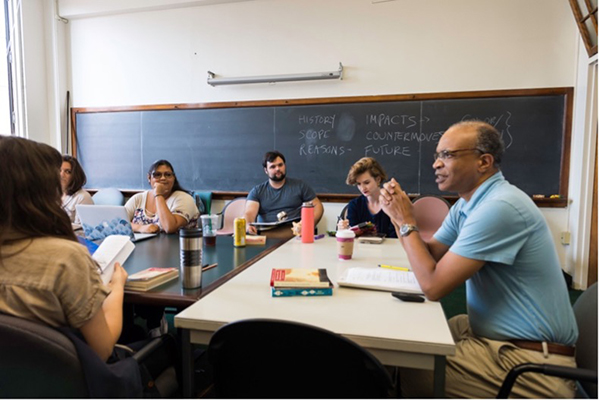Graduate Ambassador Blog Posts
Navigating the PhD Journey: Embracing Change, Building Community, and Overcoming Fear in Academic Research

What I wish I had known when I applied to the PhD program in English with a full-blown project already planned and a complete destination for my research, was that it’s okay to deviate from the path you construct for yourself.
It’s okay to build new roads, to change your materials, and to find new interests along the way.
In my first year at UR, I was highly committed to figuring out what was going on in a particular niche of 20th century American literature. I planned to write every term paper in such a way that I would have my dissertation basically written by the time I was done with coursework. According to my (very cute) timeline, I would simply have a few paltry forms to fill out and I would be done with the heavy lifting. Dust my hands off, job well done, and on to the next target–the job market.
Except, I took a seminar. And as sometimes goes in seminar, I found a new strain of research that was infectiously interesting. Down the rabbit hole I went, chasing after 17th century metaphysicians and their fabulous quirks. Next came the long and arduous process of trying to figure out how to weld this new interest onto the old. How do I write a dissertation about seemingly incompatible fields?
I’m embarrassed to admit that it took me a few years to figure out that my studies in metaphysics had prepared me for a very specific type of thing. But ultimately not the research project or dissertation I wanted for myself. As a line of inquiry, it was pulling me away from what I was committed to as a scholar.
If I had known from the start that research is not always linear, I think I would have had an easier time of it. Rabbit holes are often wildly productive. They can expand your thinking and give you tools to understand or interpret in new ways. But they don’t always connect to one another, nor are they meant to.
At some point I had to have a heart-to-heart with myself. I needed to choose what really mattered to me, what kind of scholar I wanted to be when I ‘grew up’ and finished my PhD. But it was hard to abandon something I had put so much time and energy into learning. And it was hard to articulate my changing interests to the faculty I had been working with closely for several years.
Here are the three things I learned the most from this experience:
1. The way you talk about yourself matters
One thing that helped me weather the shift in my research was changing the language around the way I thought about myself in academia. Rather than just “working on” something or “studying” it, I started thinking about “taking responsibility” for my area of expertise. What did I want to be responsible for? What did I want to contribute to? Which scholars did I want to be in community with?
Once I changed my language, I started feeling a deeper connection to the work I was doing. A work/life balance in academia is hard to strike because the work we do is typically close to our personal values. Acknowledging this aspect of academia was important for me and helped me to embrace moving on from the every unconnected rabbit hole I peered into.
2. Your support circle can change
The type of research you pursue will often dictate social elements, from the friends you meet to the faculty you work with closely. Changing lines of research will oftentimes mean your social circle will shift as well—and that’s okay! Find people that believe in what you’re doing and who will support you and the research questions you choose to ask.
You may find yourself looking for a new advisor somewhere along the line as well, and these are tricky conversations to have. Be open and honest about what you’re hoping to do with the time you have in your program and old advisors may suggest you work with someone else or offer suggestions on how to continue work but with significant shifts. At the end of the day, trust your gut, find someone who believes in you and acknowledges you as a future colleague. Mutual respect and honesty can make all the difference in an advisor/advisee relationship.
3. It’s okay to be scared
Making radical shifts when you’ve pursued one thing for a long time can be scary! You might find yourself facing imposter syndrome, moments where you don’t know “that” thing…And that’s okay! Fear in shifting research trajectories can be a useful tool, motivating you to learn more, to push yourself out of your comfort zone, and become an expert in something entirely new. Don’t let fear paralyze you. Be confident in your abilities as an academic (you made it this far, didn’t you?) and realize that it’s natural to feel uncomfortable when trying out something new for the first time.
